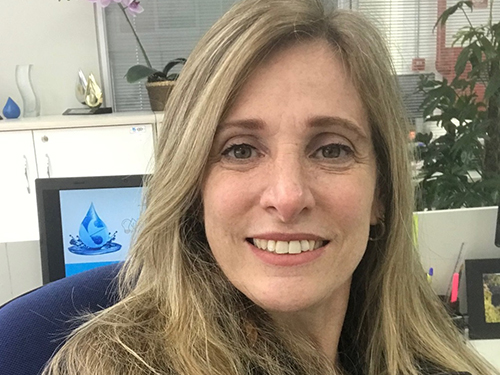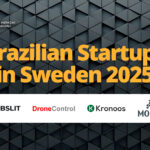In this special edition, we invited Cristina Zuffo, Superintendent of RD&I at Sabesp and participant in one of the webinars of the Annual Meeting, to tell about her trajectory in the areas of science, technology and innovation.

Tell us about your professional experience, activities and projects at Sabesp.
Cristina: I have a degree in civil engineering, I worked in the financial area for 3 years until I returned to engineering at Sabesp where I worked for 13 years in studies, projects and planning focused on supply in the Metropolitan Region of São Paulo. I developed several energy efficiency projects, pipelines, reservoirs, normal and reversible pumping stations, among many others. With this I acquired a great experience in the operation of large water distribution systems. In 2010, I was invited to take over the Technological Prospecting department and then take over the company’s RD&I superintendency. It was a great challenge, as the area was newly created and there was no company in the sanitation sector in Brazil and Latin America with a similar structure focused on PD&I that we could perform benchmarking. We had to start building strategies, guidelines and objectives from scratch, as well as dealing with a huge range of issues and demands that pass directly or indirectly through the sanitation sector, in addition to prospecting and formalizing partnerships with numerous actors related to the sector, such as companies, startups, funding agencies, financiers, regulatory agencies, universities, among others.
In the course of your career, have you faced challenges just for being a woman?
Cristina: Yes, absolutely. Some values are very ingrained in society and women themselves often end up involuntarily placing themselves in a position of submission and conformity. I never let myself be overcome by these issues, I always tried to act naturally in these situations and demonstrate my value by my actions, examples and a lot of persistence.
If so, what was the main challenge and how did you overcome it?
Cristina: The biggest challenge was to eliminate the stereotype that women are not compatible with engineering or technology. At first, they never saw me as someone who could technically discuss a project. I participated in several meetings where everyone thought I was the minutes editor … I honestly even had fun with it, because when they finally let me talk, everyone fell silent and from this moment on they started to respect me. I see that this is very common in society as a whole, especially in corporate environments, and the worst thing is that there is prejudice even from women towards women themselves. Many people ask me why I work with technology, because this is something for men…
I remember a fact that was very remarkable for me. I come from a family of researchers and studied at a college of priests. One day when I was in the third year of high school, I was taking a test, when the priest came to my side and said: “You will never enter engineering at USP, like your brothers!”, That at first destroyed me, but then it was all I needed to fight even more. Years later we met and I was able to show him with great satisfaction, my undergraduate and master’s degree at USP. There is no barrier that can prevent determination. I usually do everything at home, gardening, electrical, plumbing, painting and amazing things, but I cook too! I believe that women have to be self-sufficient and believe that they can do anything they want.
How do you perceive the change and the increased participation of women in the areas of science and innovation in Brazil?
Cristina: I see that it is gradually increasing, see our last webinar where all the speakers were women and extremely competent. I believe that in recent years the change has been occurring more rapidly, not least because I see a change in the approach of new generations and also of education in schools. Even in today’s fairy tales the change is big and women take on the role of superheroines and not just that submissive stereotype that barely spoke and was always waiting for a prince to save them. This was terrible because it has affected the subconscious of women since their basic training.
Have you encouraged diversity in your projects and / or team? If so, how?
Cristina: Yes, I always try to encourage and create a plural environment within the team. I like to encourage employees to increase their knowledge, mix competencies and always challenge themselves. I can say that we are currently able to create an environment of balance and mutual respect in the area, and the climate assessments are showing very good results and reflect this balance. It has now become normal for projects to have a balanced participation of women and men. We have many projects where the leadership is female. I venture to say that within the area today there is no prejudice, especially against women.




